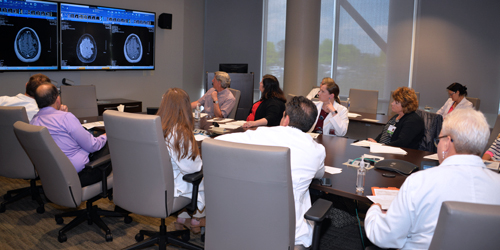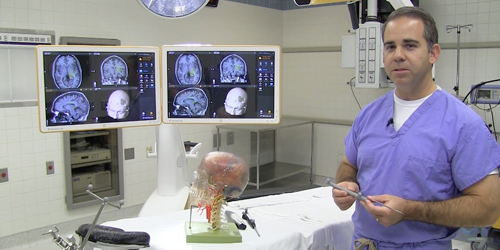
Being diagnosed with a brain tumor is a frightful experience. A patient learns that something foreign and unwanted has begun to grow inside his or her head.
Fortunately, many tumors that originate in the brain are benign, and many malignant brain tumors can be removed or eliminated with surgery or radiation. Treatments are often straightforward. After the diagnosis, the surgeon knows exactly what to do.
Other times, however, the treatment path is not clear cut. The tumor may be lodged in a difficult place; it may press against important nerves or arteries or other structures. When this happens, Mayfield physicians, physician assistants, and nurses discuss the situation at a multidisciplinary conference called Tumor Board. The bi-weekly conferences, held independently at The Jewish Hospital-Mercy Health and at Good Samaritan Hospital, serve as a kind of brain trust, bringing together experts from multiple specialties, including neurosurgery, neuro-oncology, radiation oncology, otolaryngology, pathology, and medical oncology.

Together, these brain tumor specialists seek the best possible treatment path for the individual patient. They examine the patient’s scans, pathology reports, and medical history. Discussions are thoughtful and empathetic. “She’s young,” said Peter Fried, MD, an OHC oncologist, during a recent Tumor Board presentation at the Brain Tumor Center at The Jewish Hospital. “We need to give her a fighting chance.”

“Tumor Board provides reassurance and peace of mind to our patients and their families,” says Christopher McPherson, MD, Site Director for Neurosurgery at Good Samaritan Hospital. “When their case comes back from Tumor Board, they know they’re getting more than one opinion. They’re getting a whole roomful of opinions from caring, highly trained specialists.”
Ronald Warnick, MD, a Mayfield neurosurgeon and Co-Director of the Gamma Knife Center at The Jewish Hospital, recalls a particularly compelling case.
“A middle-aged gentleman with glioblastoma was referred to the Jewish Brain Tumor Center. He had already undergone two surgeries, two courses of radiation, and two types of chemotherapy. Unfortunately, an MRI scan showed a second site of glioblastoma.
“A Tumor Board at another hospital had recommended palliative care and no further treatment. But our Tumor Board arrived at a different consensus. We recommended Gamma Knife radiosurgery to the new site of tumor followed by the biologic agent Avastin, which reduces blood flow to the tumor. The patient underwent a successful Gamma Knife procedure three weeks later and continues on regular infusions of Avastin.”
The Tumor Board process begins when a patient or referring physician sends clinical records and brain scans to a member of the Tumor Board team. Scans can be sent from anywhere in the world. Typically, they accompany an expedited appointment; occasionally, they come with a request for a second opinion. The scans are then forwarded to a physician who will oversee the case. If the physician wants input from other specialists, he or she can then present the case to the entire Tumor Board.

Together, the specialists discuss the case, reviewing the pros and cons of various treatment paths. The discussion concludes when the individual members reach agreement on a recommended strategy.
“Tumor board is an invaluable resource for us to have as providers,” says Mayfield’s Angela Kramig, PA-C, a physician assistant. “It allows us to receive expert opinions from multiple specialties. As a group we are able to collaborate on all aspects of tumor treatment, including diagnosis, surgical and non-surgical treatment, and prognosis. Having such a diverse group of medical experts allows us to ensure our patients are receiving the highest standard of care.”
— Cindy Starr